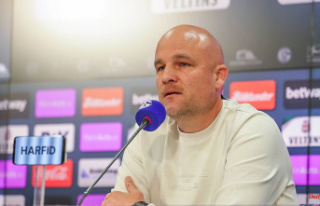Two thirds of German households still heat with gas or oil. According to the Agora Energiewende, if Germany wants to achieve its climate goals in the building sector, six million heat pumps will have to be installed by 2030. Philipp Pausder and his company Thermondo want to make their contribution.
At least since the Ukraine war, many households have been debating: Do we need a heat pump or not? Philipp Pausder stopped asking this question a long time ago. The former basketball pro has been dedicated to heating with his startup Thermondo for almost ten years - and now wants to help install thousands of heat pumps in German residential buildings.
When Thermondo was founded, however, it did not play a role. Ten years ago, the focus was on converting old oil heating systems to new gas heating systems - the standard in heating construction at the time, explains Pausder in the ntv podcast "So techt Deutschland". Because the change has reduced CO2 emissions by 50 to 55 percent. "We thought that was cool," says the entrepreneur. "Our mindset wasn't that we should reduce CO2 emissions to zero."
In large numbers, this is only possible with the help of heat pumps, says Pausder, which, however, are rare in Germany: two-thirds of German households currently heat with gas or oil. Current figures from the Federal Association of the German Heating Industry show that last year alone, 70 out of 100 Germans opted for gas as the energy source when buying a heating system.
That must change soon, because the energy crisis and the federal government are forcing many people to convert. The coalition agreement stipulates that from January 1, 2025, "every newly installed heating system must be operated on the basis of 65 percent renewable energies". With the first relief package, the plans were brought forward to 2024, but at the same time the word "if possible" was added. It also announces an exchange program for gas heating systems that are more than 20 years old, which, according to the lobby organization Agora Energiewende, will mean that around six million heat pumps will have to be installed by 2030 if the traffic light wants to achieve its climate goals in the building sector.
Anyone who wants to make the switch can choose from two variants: Heat pumps work either with geothermal heat or with air heat. Because of the necessary drilling, the installation of the first variant is at least twice as expensive as the air version, which is still suitable for cooler regions.
"It's a widespread cliché that heat pumps don't work when it's cold," says Themondo boss Pausder, who rhetorically asks: "Why are there most of them in Norway and Sweden?"
It depends on the technology, says the entrepreneur. The most important component of a heat pump is the compressor, which draws energy from the air or ground. According to him, good compressors can do this even at minus 15 degrees.
At Thermondo, the important component comes from LG. The South Korean electronics group and the Berlin heating company have entered into a partnership in order to be able to manufacture as many heat pumps as possible. By next summer, 10,000 should be installed in Germany alone. Last year, the industry set a new record with the installation of 154,000 heat pumps. In order to achieve the goals of the traffic light, there must be at least 500,000 systems per year.
Nevertheless, Philipp Pausder is convinced that Germany will achieve these goals and that heating will be climate-neutral in the near future. How, he tells in the new episode of "So techt Germany".
Philipp Pausder is married to Verena Pausder, who is also an active founder and also answered questions from Frauke Holzmeier and Andreas Laukat in the "So techt Deutschland" podcast. The conversation with Philipp Pausder took place as part of the RTL Sustainability Week, which is organized together with Vox, ntv and GEO. The focus is energy, the motto is: Let's do it!












